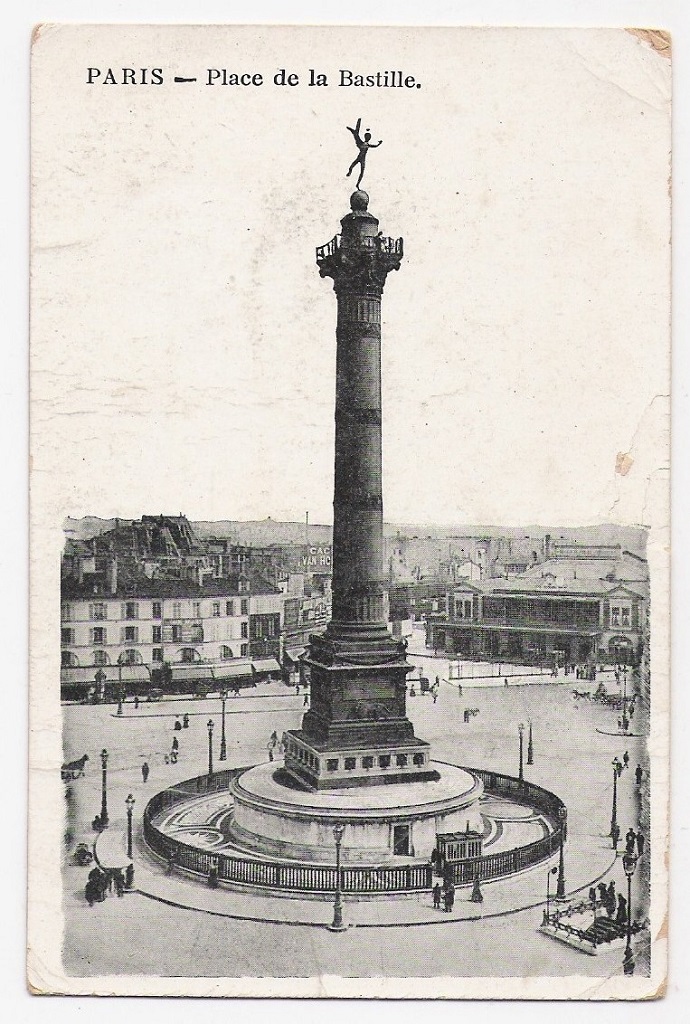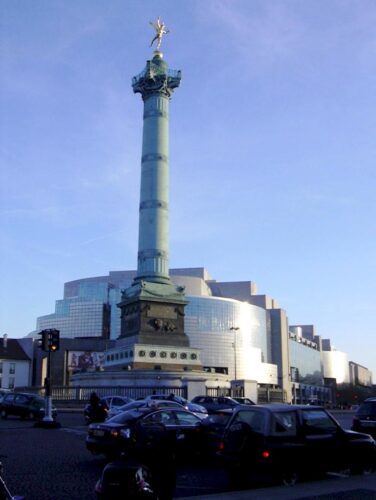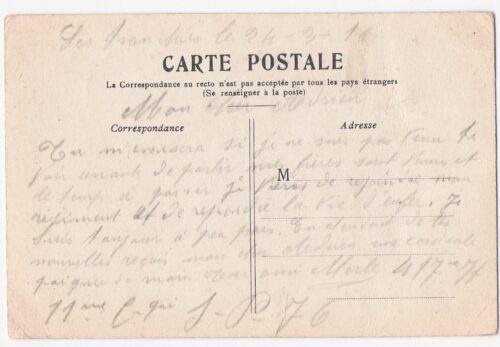This is the Place de la Bastille in Paris, about 100 years ago:

And what it looks like in the early 21st Century:

On the postcard, one can see the building that use to stand before the Opera Bastille was built. On the other hand, the July Column hasn’t really changed since it was built in 1840. Interesting, while smaller, what remains of the building on the left side of the postcard hasn’t changed much either.
I’ll tell you more about the history and the details of the Place de la Bastille at a later date, today, I’d rather focus on the other side of the postcard:

It was sent to my grandfather (Adrien) by a man called Merle. Here is what it says:
The trenches (1), March 24th, 1916.
My dear Adrien,
Sorry for not visiting you before leaving. My brothers came and time passed.
I have just rejoined my regiment and I am back to this hellish life. I am still so-so (2). Hoping to hear from you soon, receive my dear Adrien a cordial handshake. (3)
Your friend, Merle
417th Infantry, 11th Company, J-P 76 (4)
(1) I was having trouble reading the name and for a while, I thought it was the name of a village, but one reader (Olivier) reminded me that usually, soldiers were not allowed to tell where they were in their correspondence. So Merle just wrote “the trenches” instead.
However, Merle belonged to the 417th Infantry Regiment and I was able to find its history – if you can read French it’s there. In March 2016 it was stationed at Vingré in the Aisne department.
(2) Not too sure I understand what he says here in the original text. Probably an expression that has fallen out of use. I assume he means that he’s not feeling so great. He’s hanging in there, or something like that. We can imagine the mood of soldiers after two years of this terrible war when they had to return to the front after a leave.
(3) I like the “cordial handshake” thing. Feels so old school but in a good way.
(4) Not sure what J-P 76 means. His military number? No idea.
I tried to find out more about this Merle. I don’t think I have many cards written by him. One or two more. Maybe? I can’t remember at the moment (nor dig through them). His name is not mentioned in the Regiment’s history mentioned above.
France has an official online archive of all soldiers who died for the country. Not the most uplifting thing, but very useful when looking for information about World War One.
Searching among the Merles who were born near my grandfather’s village, of a similar age to his (they seemed to be friends) and still alive in March 1916, I found a Jean Urbain Merle born in 1881 in Lamagistère (so, he was four years older than my grandfather and born just a couple of kilometers away). Could be him.
It is quite interesting that he is included in this archive because he did not die in combat, nor even during the war. He died in Nérac in 1919 of “illness. ” The fact that it’s mentioned on his death record from the ministry makes me think that he was in a military hospital. I don’t know if I’m influenced by the current situation, but I wouldn’t be surprised if this “illness” was actually the Spanish Flu. Interestingly, maybe because it takes place so close to World War One, we rarely hear about individuals who died from the flu. It’s only ever talked about in vague and general terms. I wonder why.
There’s one problem, though. Jean Urbain Merle is listed as a member of the 11th Infantry Regiment, not the 417th. However, when you delve into the history of the 417th, you learn that it was disbanded in 1917. So Merle could have been reassigned to another regiment. A search on the internet tells me that the battalions of the regiment were transferred to the 167th and 168th regiments, but did this affect all the soldiers? No idea.
So there is no certainty whether my grandfather’s friend is Jean Urbain Merle or not.
We’ll see later if we find other cards signed by him and whether they contain more information.
Stay tuned…
And if you have stumbled upon this article by chance and are wondering what it is all about, it’s all explained there:
If you found this post interesting and you want more, do not hesitate to subscribe to the blog (you have all you need in the sidebar).

Discover more from liminal web
Subscribe to get the latest posts sent to your email.

I think the place named on the Bastille postcard is “les tranchées”, meaning the trenches, as the soldiers where not allowed to name the places their regiments where in.
Indeed! Well spotted. I was so hellbent on looking for the name of a village that it didn’t cross my mind.
Thank you (I’m editing – and giving you credit).